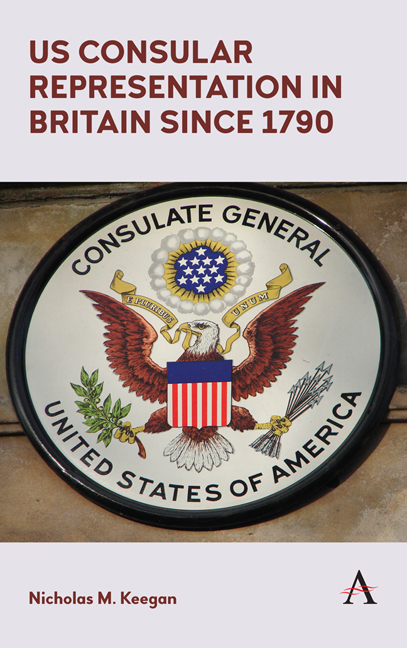Book contents
- Frontmatter
- Dedication
- Contents
- List of Illustrations
- Foreword
- Preface
- Acknowledgements
- Introduction
- PART 1
- PART 2
- PART 3
- Chapter Six Consular Posts and Consular Agencies in Major Cities
- Chapter Seven Belfast
- Chapter Eight Birmingham
- Chapter Nine Bradford
- Chapter Ten Bristol
- Chapter Eleven Cardiff
- Chapter Twelve Dublin
- Chapter Thirteen Dundee
- Chapter Fourteen Dunfermline
- Chapter Fifteen Edinburgh and Leith
- Chapter Sixteen Falmouth
- Chapter Seventeen Liverpool
- Chapter Eighteen London
- Chapter Nineteen Newcastle upon Tyne
- Chapter Twenty Southampton
- Chapter Twenty-One Stoke on Trent
- Chapter Twenty-Two An Evolving, Adaptive Service
- Appendix: Locations and Categories of Consular Offices
- Notes
- Sources
- Bibliography
- Index
Chapter Thirteen - Dundee
from PART 3
Published online by Cambridge University Press: 21 June 2018
- Frontmatter
- Dedication
- Contents
- List of Illustrations
- Foreword
- Preface
- Acknowledgements
- Introduction
- PART 1
- PART 2
- PART 3
- Chapter Six Consular Posts and Consular Agencies in Major Cities
- Chapter Seven Belfast
- Chapter Eight Birmingham
- Chapter Nine Bradford
- Chapter Ten Bristol
- Chapter Eleven Cardiff
- Chapter Twelve Dublin
- Chapter Thirteen Dundee
- Chapter Fourteen Dunfermline
- Chapter Fifteen Edinburgh and Leith
- Chapter Sixteen Falmouth
- Chapter Seventeen Liverpool
- Chapter Eighteen London
- Chapter Nineteen Newcastle upon Tyne
- Chapter Twenty Southampton
- Chapter Twenty-One Stoke on Trent
- Chapter Twenty-Two An Evolving, Adaptive Service
- Appendix: Locations and Categories of Consular Offices
- Notes
- Sources
- Bibliography
- Index
Summary
The city of Dundee is situated on the north shore of the Firth of Tay in Scotland. Originally internationally famous for the three ‘Js’ of its main industries: jam, jute and journalism, only the latter now remains.
The first United States consular officer was Edward Baxter, a Scot, whose earliest despatch was sent in December 1833 in which he describes himself as vice consul. He was nominated by President Andrew Jackson in March 1834 to be upgraded to consul and confirmation of this was announced in July. He served until 1845 when he was replaced by Stewart Steel of Pennsylvania, an attorney and businessman, who had been born in Ireland but had become an American citizen. James McDowell of Ohio succeeded him in 1850; in the remainder of the 1850s the consuls were Thomas Steere of Rhode Island (1853– 1858) and Joseph B. Holderby of North Carolina (1858– 1861). The salary in 1853 was $500 with the right to carry on trade, however this was increased in 1856 to $2,000 but the consuls were no longer permitted to engage in trade.
In 1861, Lincoln appointed Hugh Smith of Kentucky, the son of his old friend the Reverend James Smith. The appointment was short-lived, however, for after a year Hugh turned over the appointment to his father due to ill health and returned to America. Reverend Smith, who took over formally in 1863, had been born in Scotland but had become a naturalized American citizen. Lincoln asked Secretary of State Seward in January 1863 to ‘send me a nomination for Rev. James Smith […] an intimate personal friend of mine’. Smith had been pastor at the First Presbyterian Church in Springfield, Illinois, and in 1850 had conducted the funeral service for Lincoln's three-year-old son, Edward. Lincoln had become so interested in a book written by Smith in the 1840s entitled Christian's Defense that he asked him for a copy so that he could finish reading it. The two struck up a close acquaintanceship. Two years later, Lincoln gave a lecture on the Bible in Smith's church ‘which was said by ministers to be the ablest defense of the Bible ever heard in that pulpit’.
- Type
- Chapter
- Information
- US Consular Representation in Britain since 1790 , pp. 135 - 142Publisher: Anthem PressPrint publication year: 2018

